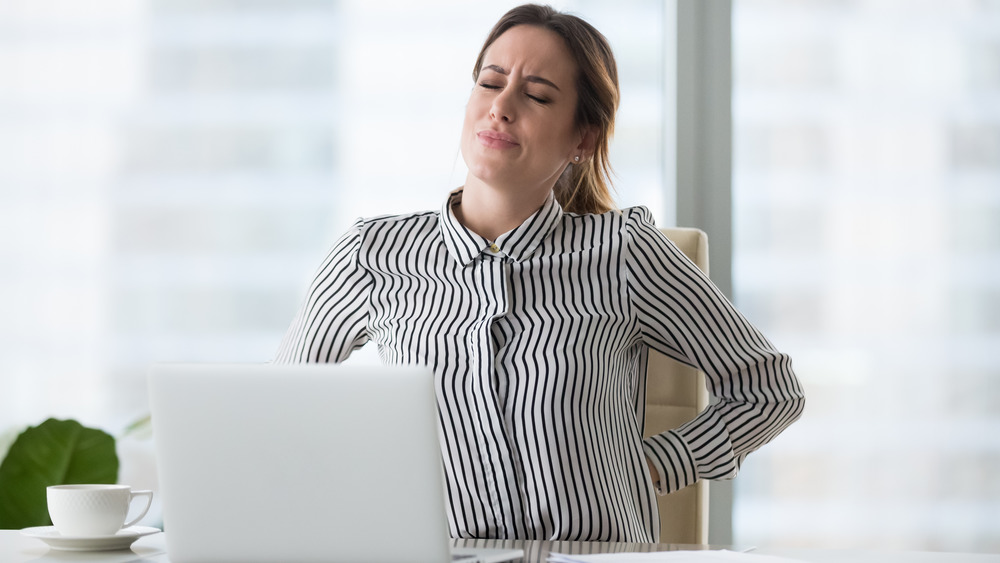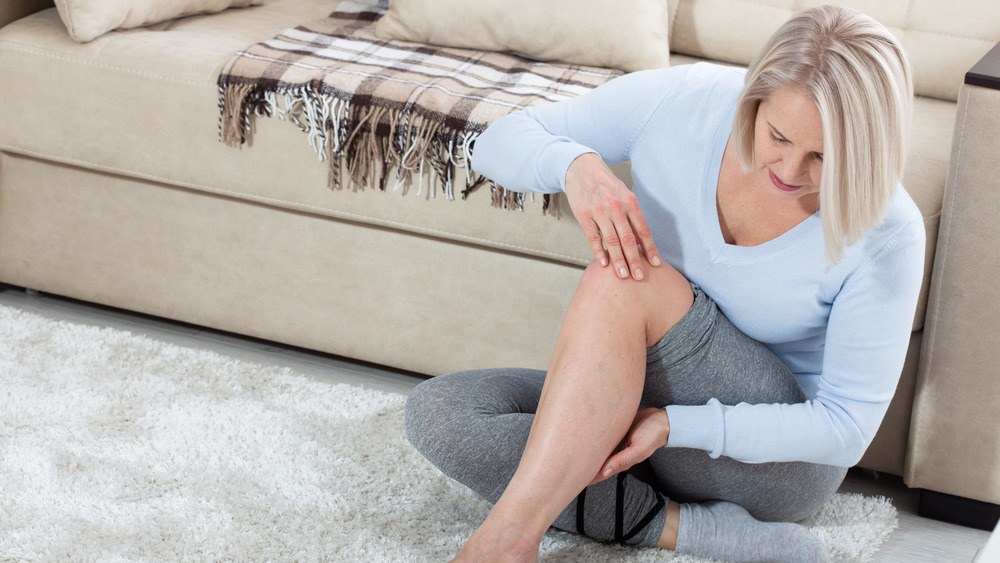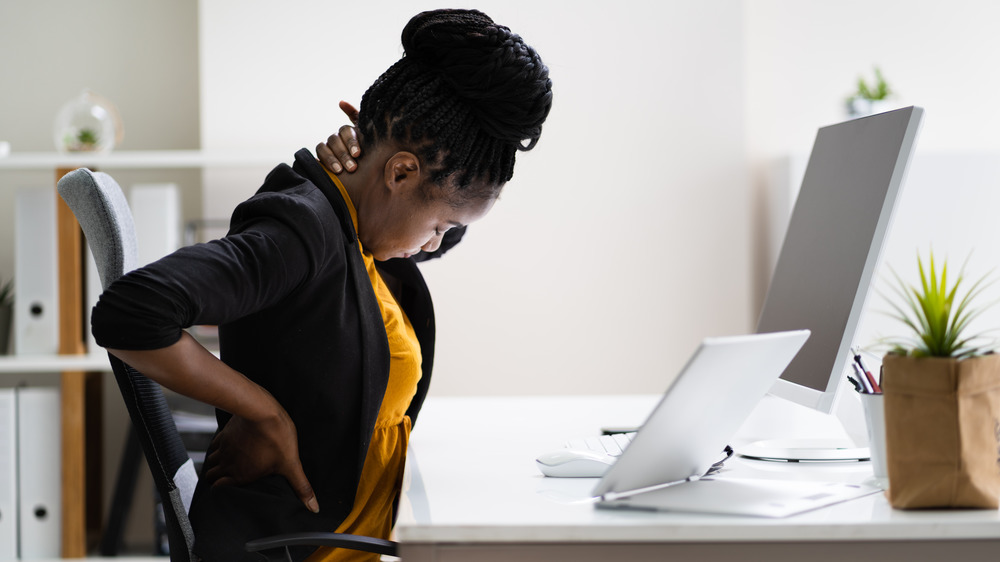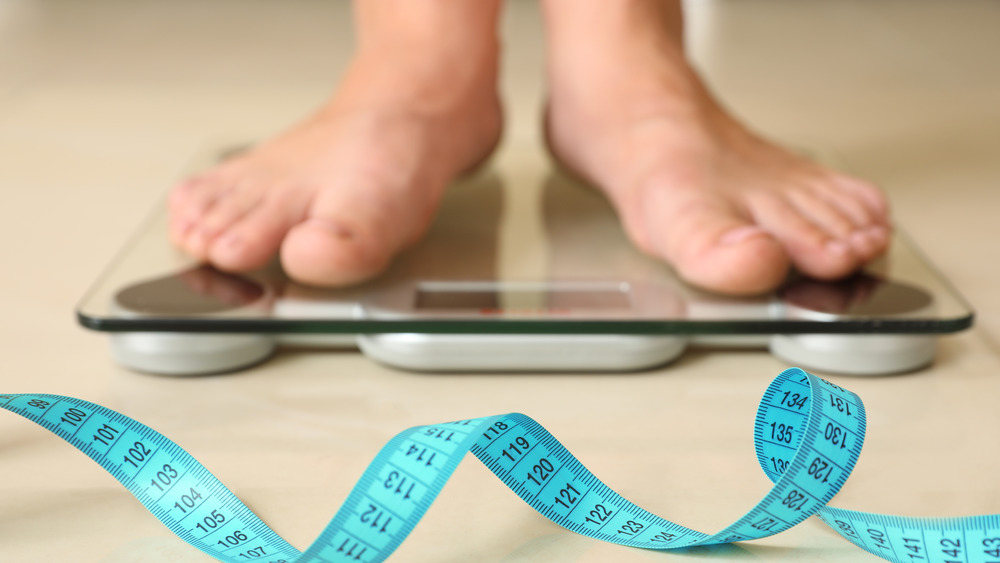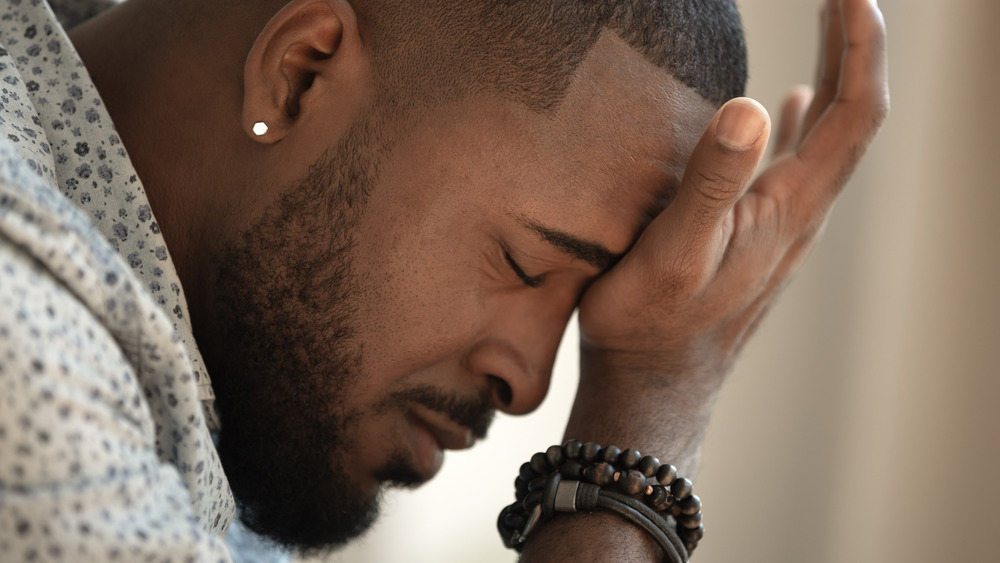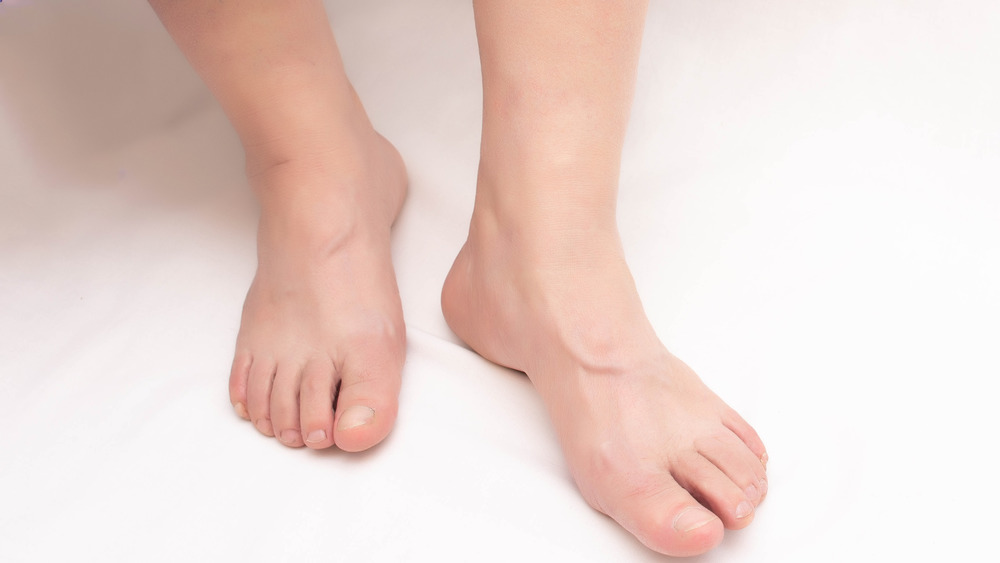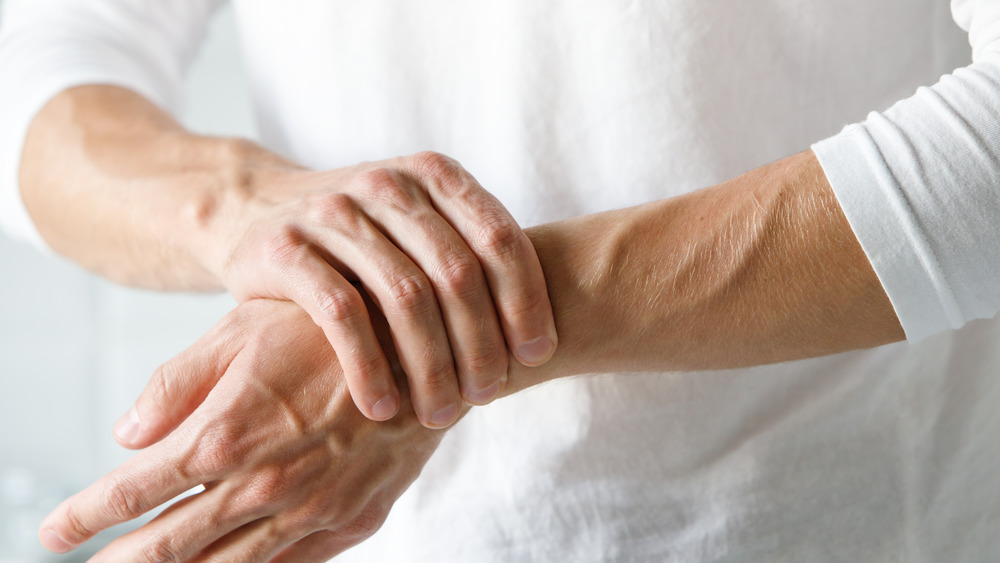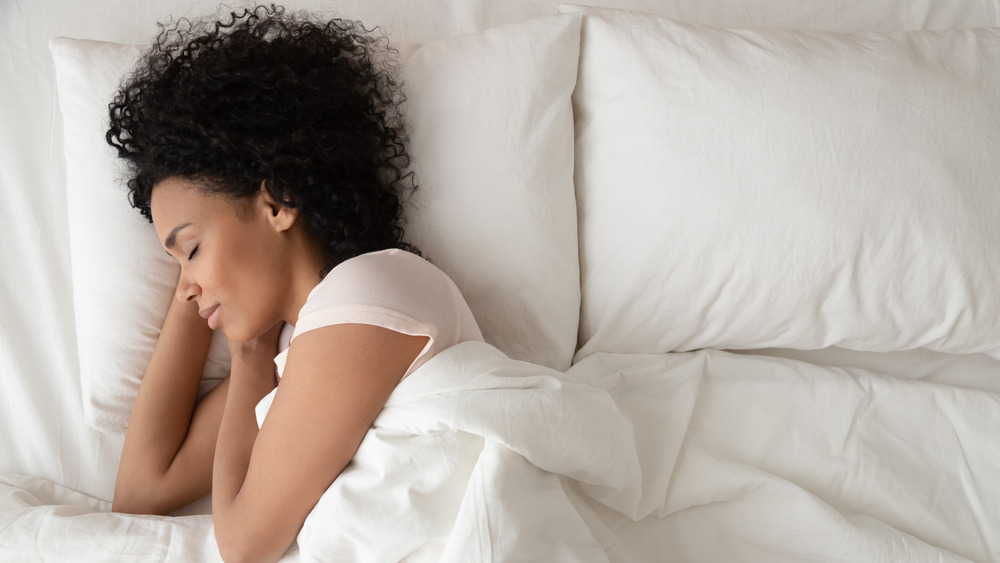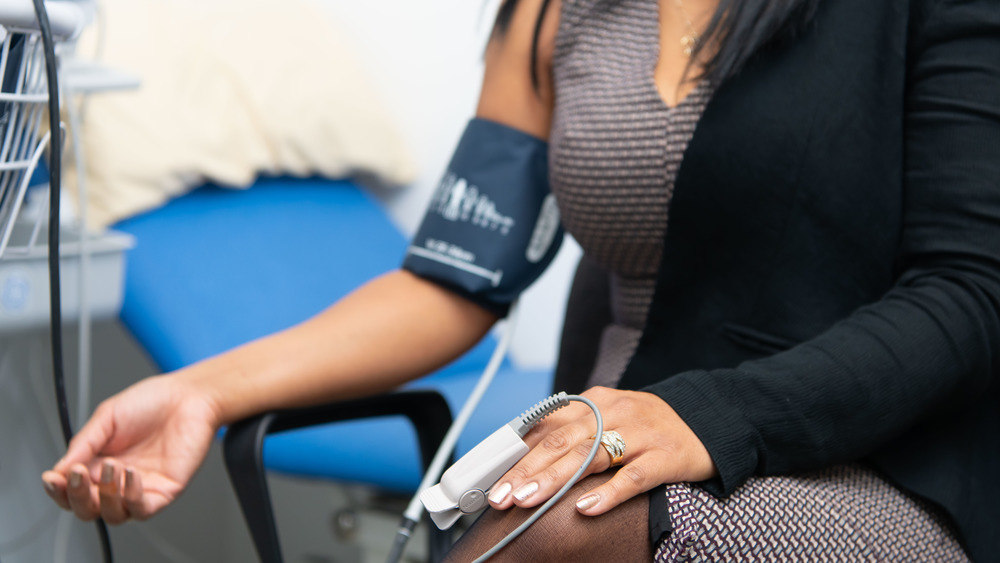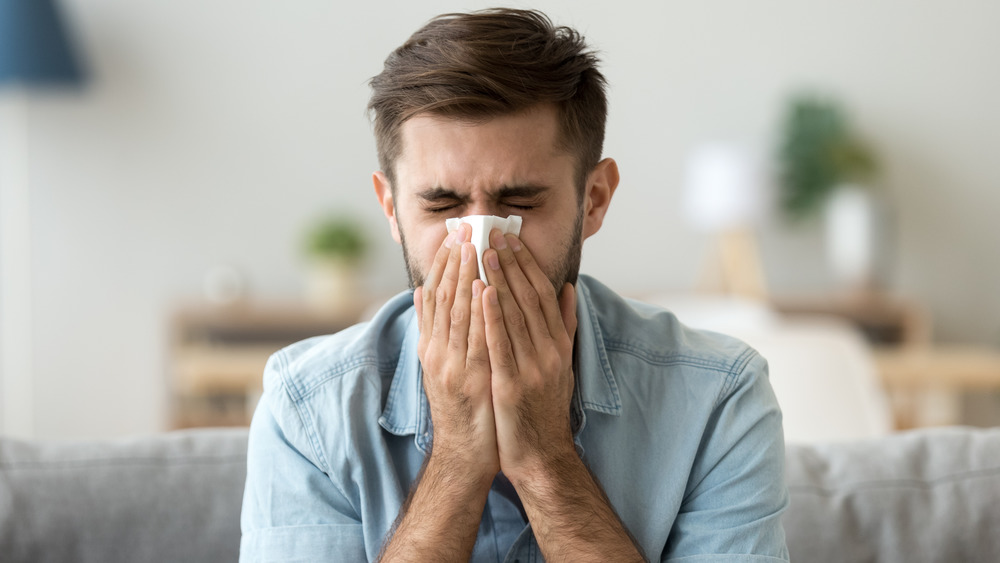You Spend Too Much Time Sitting Down If This Happens To Your Body
You're probably sitting down somewhere while reading this. To be fair, we're sitting down too. Oh, the irony. While we're not going to suggest you stand up right this second, we think it's pretty important to share with you just how dangerous it is to do too much sitting around. It's so bad, in fact, that it can lead to death. Okay, okay, you're not going to just drop dead just from taking a seat, but if you spend all of your days sitting around? The research shows this activity — or rather inactivity — is linked to premature death.
Even if that doesn't happen (let's not get too dramatic), sitting around so much is a habit that's certainly going to take a toll on your physical and mental health. You might be surprised at just how much lounging on the couch or sitting in an office all day every day can hurt you. And you might be even more surprised once you consider all the ways that doing so might have already done some damage.
Here's a look at some tell-tale signs that you spend far too much time sitting down. And, of course, some words of encouragement to get you (and us) up and moving!
If you've been sitting too much, your legs may feel weak
If you spend the bulk of your time not using your legs, they may start to feel like Bambi's legs after a while — that is, sort of useless. If you sit around too much, your leg muscles can weaken from underuse, according to Healthline. "Without strong leg and glute muscles to stabilize you, your body is at risk of injury," the site continued.
Dr. Elan Goldwaser, an osteopathic physician with NewYork-Presbyterian Lawrence Hospital, told Health Matters that spending too much time in a seated position can lead to a whole host of other issues that travel up your legs and then up your spine. "To compensate for these poor leg mechanics, the low back starts to take on extra strain as it unnaturally bends against the hip dropping during every step," he explained. "This eventually causes pain that travels up the spine and into the neck." In other words: Leg pain will only get worse. So stand up and do some leg workouts.
Sitting too much results in poor posture
It may not come as a big surprise that poor posture is at least partly a product of sitting around too much. If you think about it: When you're in a seated position, chances are you're not sitting upright. And your bones aren't all stacking up on top of each other as they would in a standing position (with good posture, anyway). Dr. Elan Goldwaser, an osteopathic physician with NewYork-Presbyterian Lawrence Hospital, told Health Matters that poor posture can lead to pain points all around your body.
"The neck gets tense and tight because we're straining," he explained. "We're arching our necks up a little bit, which increases the curvature of our necks, or cervical lordosis. It puts a strain on our trapezius muscle, which connects to the shoulder and the upper back to hold the neck up in place. Over time that becomes tender, painful, and tight. We begin to develop those classic 'knots.'" Gradually, your whole back will start to arch forward more, and your whole body will cave in on itself, he warned.
Sitting too much can lead to a bad back
If you think you have a "bad back," there's likely a reason. You might just be sitting down too much, perhaps at work. This could be causing your back to hurt, according to research published in PLOS One. But your back pain isn't only uncomfortable. According to the University of California, Los Angeles Spine Center, "Sitting in a slouched position can overstretch the spinal ligaments and strain the spinal discs." Eek, that sentence alone sends chills down the spine.
If you keep hunching over in your chair all the time, you might actually damage your spinal structure, which can contribute to pain in other areas of your body. This pain can become reoccurring, and even occur when you're not seated. Be mindful of how long you're glued to your chair, and make sure to get up and stretch or exercise every once in a while. Oh, and because occupational low back pain is a real thing, you should know that standing desks are a great option for people who have "bad backs" already.
If your hips are constantly hurting you, you might be sitting too much
Experiencing some pretty serious hip pain? Chances are you're not standing up or moving around enough. Dr. Elan Goldwaser, an osteopathic physician with NewYork-Presbyterian Lawrence Hospital, told Health Matters that too much sitting could take a toll on your hips. Yes, even if you're young!
"When you're sitting, you're putting all your muscles into a different kind of posture," he explained. So you're stretching some of the hamstring muscles, you're loosening some of the quadriceps, and you're creating a different kind of posture for your hips." It only makes sense then that when you go to get up and move your pelvis back into it's rightful standing position, some of those muscles will get strained in the process. Dr. Goldwaser warned that you might even compress nerves.
This is a problem not only because it's painful, but because your hips are the "keystone for the body," Dr. Goldwaser said. They ultimately need to be sturdy enough to battle gravity and hold the rest of your body in good alignment. If they can't, your legs will eventually collapse inward, which will put pressure on your knees, which will ultimately flatten your feet, and so on.
Sitting too much can result in a slowed metabolism
Is your metabolism super sluggish these days? It could be from not getting your body up and moving enough. A study published in the Journal of Renal Nutrition suggested that there are serious "metabolic consequences" that stem from physical inactivity.
Basically, sitting down too much instead of moving around enough can lead to muscle atrophy, a reduced capacity to exercise, and insulin resistance. Plus, it can knock your energy right off balance. This can all lead to a whole host of issues like hypertension and hyperglycemia, according to the study. These conditions and others that result from inactivity put you at a higher risk of developing coronary artery disease and having a stroke — which you definitely don't want to have, of course.
If you're already in too deep, exercise can help counteract the consequences of your sedentary lifestyle. But you have to keep up with the exercise and get yourself into a healthy routine in order for it to work.
Memory problems can result from sitting too much
It may sound hard to believe, but research published by the University of California, Los Angeles suggested that sedentary behavior is linked to memory problems. So the more you sit, the more forgetful you may become.
Essentially, the researchers asked a group of people about their activity and levels and determined how much time they spent sitting. Then, they gave each person a high-resolution MRI brain scan to look at their medial temporal lobes. This is the part of the brain that's involved in the formation of new memories. The researchers found that the people who sat around more had thinner medial temporal lobes. Even high-level physical activity wasn't enough to offset the consequences of their sedentary lifestyles.
"Obviously the thing to do is reduce the number of hours we spend sitting," Prabha Siddarth, a biostatistician and the lead author of the study, told Today's Geriatric Medicine. "But for some of us who have jobs that require us to sit in front of a computer, the next best thing is to get up and move around every hour or so for five minutes."
Developing heart disease can be a sign of sitting too much
If you're experiencing cardiovascular problems, you should know that they may be tied to sitting too much. The Centers for Disease Control and Prevention (CDC) warned of a relationship between sedentary lifestyles and poor heart health. Leisure time, like sitting on the couch and watching TV, is a major risk factor for cardiovascular disease (aka heart disease), according to the centers. And heart disease is the leading cause of death for adults in the United States.
By not exerting enough energy every day and instead staying physically inactive, you increase your risk of developing the disease. "Even among individuals who meet current physical activity guidelines, high levels of sedentary activity might lead to negative health outcomes," according to the CDC.
It's important to keep up with regular exercise and get your blood flowing, especially if you have a job that requires you to sit all day. The less active you are, the worse heart complications can get.
Feeling depressed can mean you're sitting too much
Have you been feeling depressed lately? Deeply sad, irritable, unmotivated, uninspired, or even doomed? While depression can stem from a whole host of sources and last a long time or just hit you for a little while, a sedentary lifestyle can also fuel depression. According to research published in the journal Medicine & Science in Sports & Exercise, too much time spent in front of the TV is linked to depression. While the same cannot be said for all types of sedentary behaviors, sitting all day and flipping channels has been linked to "adverse mental health."
A study published in the Journal of Affective Disorders also supports this. The study found that people with depression spent 95 percent more time engaging in "sedentary behavior" than people without depression. This is most notable in adults over 65 years old, who largely have mobility limitations, but it can happen to anyone.
If the veins in your legs or feet are swelling, you may be sitting too much
Sitting too much can lead to the swelling of the veins in your ankles and feet. So up and at 'em! You don't want to deal with what could come if you keep up your sedentary lifestyle. According to Columbia Surgery, more than half of American adults have discolored and raised veins that cause the ankles to swell up and that make the legs feel sore and achy. These are called varicose veins, and if you leave them untreated, they could cause you even more trouble down the line.
How do varicose veins even happen? According to Vein Nevada, a vein specialty center, regularly sitting for long periods of time can decrease circulation in your legs. When this happens, you veins have to work extra hard to move your blood up to your heart, which can cause them to swell and sometimes even cause blood clots. If you sit with your legs crossed or bent, you could be doing even more damage.
You might be sitting too much if you have serious joint pain
Joint pain isn't fun to deal with, and it tends to gets worse over time. While joint pain can start to affect people as they get older, there's a chance that your joint pain is stemming from your lifestyle. According to St. John's Health, leading a sedentary life — sitting or lying down often instead of getting a healthy dose of physical activity into your daily regimen — could be seriously harmful to your joint health. Not only can sitting at a desk all day or unwinding on the couch all evening exacerbate preexisting joint problems, but such sedentary behaviors can also spur joint problems. Read: arthritis.
Arthritis is a term that refers to all joint pain and joint disease. There are more than 100 types of it and related conditions, but osteoarthritis, which happens when the cartilage between your bones rubs away, is the most common. Osteoarthritis can cause stiffness, swelling, and pain. Stretching and getting regular exercise, however, can prevent osteoarthritis from developing and help treat it if you already have it.
If you feel exhausted after lounging around, you're likely sitting too much
Have you ever taken a nap in the middle of the afternoon only to wake up feeling even more tired? It's called feeling groggy. But it's not just because your body clock is thrown off from sleeping in the middle of the day. The fact is that lounging around all day can actually feel exhausting. You might be feeling so tired not because you've exerted too much energy but, rather, because you haven't exerted enough energy.
According to research published in the Journal of Lifestyle Medicine, there are adverse effects of prolonged sitting behavior. The study found that most people in offices feel pretty exhausted at the end of a work day, after they've been sitting at their desks for hours on end.
The next time you go to take a rest when you're feeling wiped, consider what you've been doing that day. If you've mostly been sitting around, maybe it's actually a brisk walk you need.
Your high blood pressure could be from sitting too much
Do you have high blood pressure? If so, it may just have to do with how you're spending the majority of your days. If you spend a lot of time in a seated position or lying down, this could cause your blood pressure to rise, according to a study published in the Journal of Lifestyle Medicine.
The study looked at a group of office workers who spent an average of about six hours of an eight-hour workday in a seated position. About 49 percent of the participants didn't feel comfortable at their workstations, and 73.6 percent of them felt wiped out throughout the day. Moreover, 6.3 percent of them suffered from hypertension, or high blood pressure.
High blood pressure can be cause for concern due to the risks associated with it. The American Heart Association explained that such risks include heart attacks, strokes, heart failure, kidney disease or failure, and more.
Feeling anxious may have something to do with sitting too much
Feeling anxious? According to the National Institute of Mental Health, anxiety can cause restlessness, fatigue, difficulty concentrating, irritability, muscle tension, sleep problems, and more. While you may experience anxiety for an entire array of reasons, one of those reasons may be because you're not moving your body enough.
A study published in BMC Public Health found an association between sedentary lifestyles and anxiety. While more research needs to be done about the different kinds of sedentary behavior (TV time or computer screen time, for example) and anxiety, evidence purports that the more you sit around doing nothing, the more anxious you might feel.
Sure, taking some time to exercise or meditate can do wonders for your mental health. But if you like to unwind with a TV show or book, be mindful of just how much time you're taking to be sedentary.
Getting sick all the time is a sign you're doing too much sitting
If you're the kind of person who gets sick all the time, you might want to check in with yourself and reconsider how you're living your life. If you don't seem to be getting enough exercise, for example, that might be taking a toll on your immune system.
According to research published in Frontiers in Physiology, exercise positively affects your immune system by regulating your immune cell populations. Without it, you can get sick a lot more, and it may take longer to recover when you do fall ill.
A review published in Current Pharmaceutical Design explained that the positive effects that physical activity have on your immune system strongly depend on the type and intensity of your exercise. But, generally, any exercise is better than no exercise. So whether you pick up a boxing class thrice a week or go for a short walk after work every day, you're still doing yourself a major favor.

